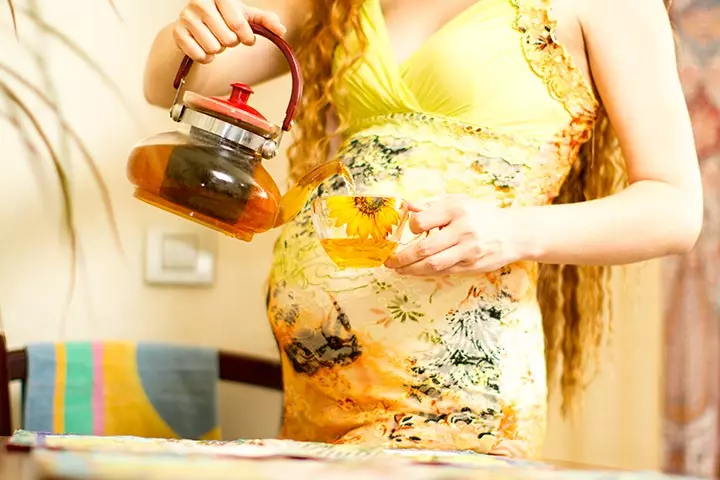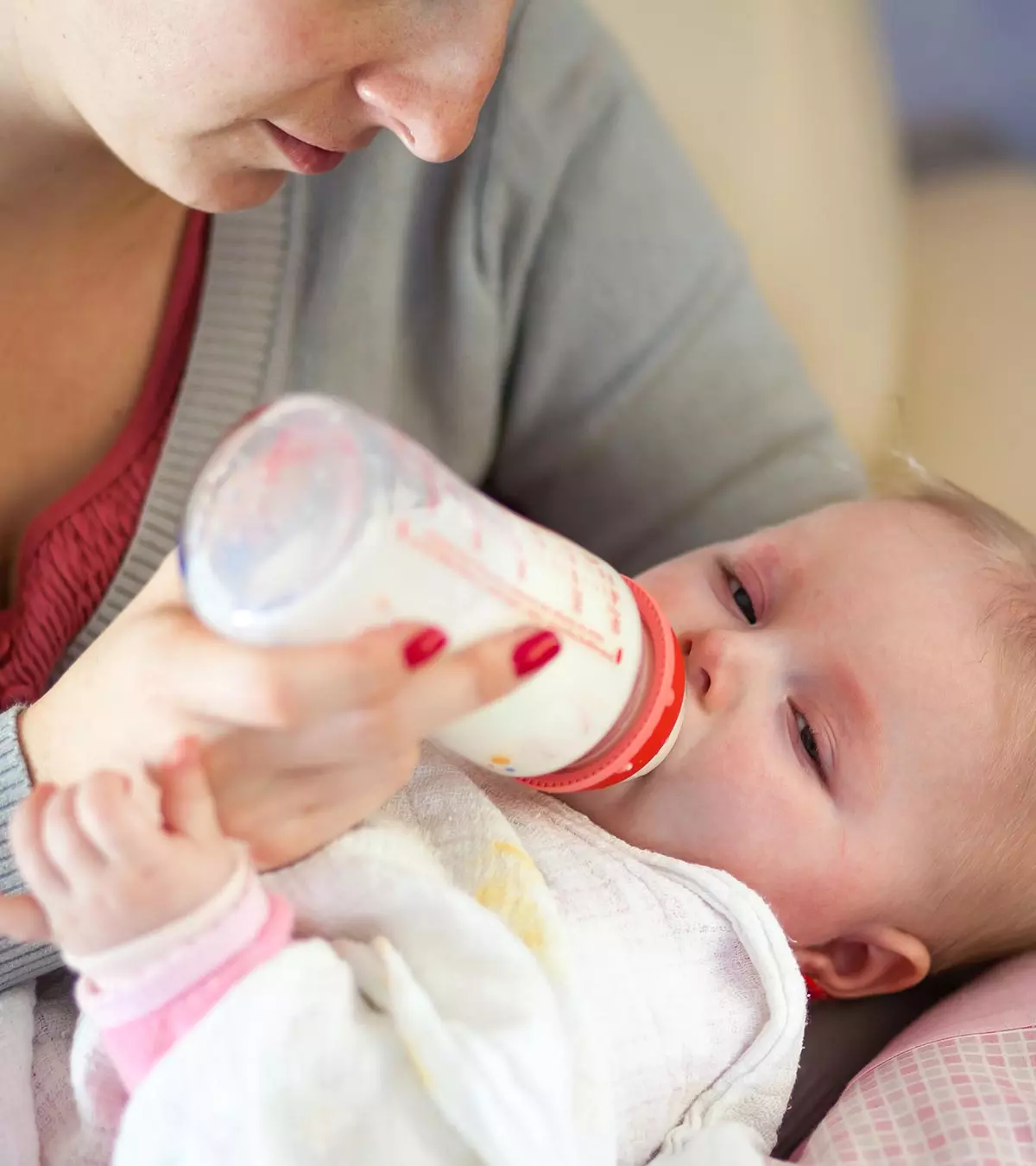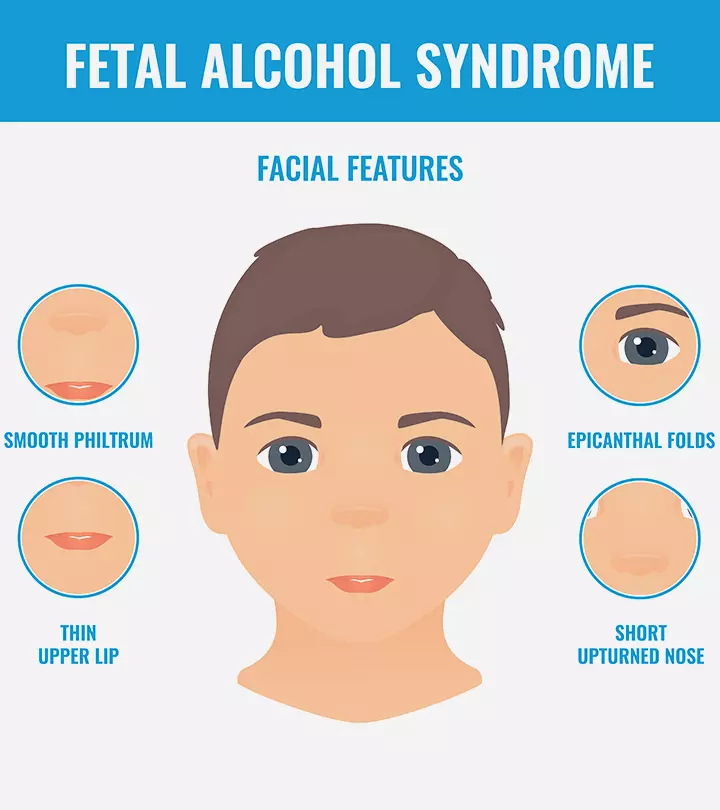
Image: iStock
There may be several causes for vomiting in babies, ranging from indigestion and excessive crying to gastrointestinal tract anomalies. Although occasional vomiting in babies is not a cause for concern, persistent, severe vomiting requires immediate medical attention. This is important to detect and treat the underlying cause and avoid dehydration in babies.

Read on to learn more about the possible causes and home remedies treatment options for vomiting in babies and when to contact a pediatrician.
Key Pointers
- Reflux, stomach flu, and infections are some reasons why your baby might be experiencing vomiting.
- In less than three-month-old babies, vomiting that lasts for more than a day, projectile vomiting, and greenish-yellow colored vomit are some signs you need to see a doctor.
- You may offer breastmilk or bottle feed as soon as your child is ready after an episode of vomiting to check if they throw up again.
Common Causes Of Vomiting In Babies
Babies may vomit or experience regurgitation due to various reasons. These include (1):
1. Reflux
A baby’s esophagusiMuscular tube that passes food and liquid from mouth to stomach. (food pipe) is not yet matured, so milk may back up into the food pipe after feeding. This may cause milk to come out from the baby’s mouth or nose. The process of bringing up or gastroesophageal reflux after breastfeeding or bottle feeding is called spitting up, or possetingiBabies bringing up a small amount of milk after a feed without forceful stomach contractions. (2). The condition normally gets better with time and especially when solids are introduced in the diet. Reflux usually clears up within 18 months as the baby grows.
2. Stomach flu
Stomach flu, also called viral gastroenteritis, stomach bug, or tummy bug, is a viral infection of the stomach.
In addition, digestive issues like vomiting, diarrhea, fever, and tummy pain are some symptoms of tummy bugs. Babies may have vomiting for a couple of days in the case of stomach flu.
3. Infections
Vomiting and diarrhea can be seen in many other gastrointestinal or organ system infections since the immune system is fighting against it. Urinary tract infections (UTI) and chest infections are common infectious causes of vomiting in babies.
 Quick fact
Quick fact4. Food allergies

Allergies or intoleranceiUnpleasant digestive symptoms after consuming certain foods or drinks without involving immune responses. to food may cause vomiting in babies along with cramps and diarrhea. Other symptoms indicative of allergies include skin rashes, such as hives with swelling and itchiness, itching or swelling of the lips, tongue, or mouth, and breathing problems (3). Maternal dietary factors can be a cause of allergies in breastfed babies. Common allergens include milk, eggs, nuts, fish, seeds, and wheat. Allergic reactions and symptoms, such as vomiting, may develop from minutes to hours after exposure to allergens. Milk intolerance, which is lactose intolerance (inability to digest lactose sugar in milk due to lack of lactase enzyme), is different from milk allergy (the body’s immune system reacts to milk proteins). The latter is more common in babies (4).
5. Food poisoning
It may happen in bottle-fed or weaning babies. Unsterilized bottles, stale food, and food or water contaminated with SalmonellaiBacteria that affect the intestinal tract, leading to foodborne illnesses. or E. coli bacteria could cause food poisoning, leading to vomiting and diarrhea.
6. Poisoning
Babies who crawl or walk may accidentally swallow poisonous substances, which could cause vomiting. You can avoid this by keeping toxic and dangerous chemicals and substances out of the baby’s reach.
7. Overfeeding or overeating
Breastfed or bottle-fed babies may vomit if they are overfed. Large holes in the feeding bottles can be a reason for overfeeding in most bottle-fed babies. Overfeeding a weaning baby could also lead to vomiting.
8. Congenital pyloric stenosis
Congenital pyloric stenosis is the narrowing of the pylorus (part of the stomach connecting to the intestine) from birth. This condition prevents food from entering the intestines from the stomach and causes forceful vomiting. Pyloric stenosis may also cause nutritional deficiencies. The condition is normally not visible at birth but slowly develops over time and symptoms get worse by four to six weeks. Babies are very hungry but vomit projectile shortly after the feed.
Jessica, a mom, talks about her experience with her baby boy’s pyloric stenosis. She says, “Sam had large vomiting episodes when he was about three and a half weeks old. Then, after feeding him that day, he threw up all over me. He was convulsing, with curdled breastmilk gushing out of his mouth until my clothes were soaked. When it happened again three days later, we called our clinic and talked to the doctor on call. We described the vomiting as ‘projectile’ because it was forceful and traveled a few inches from his mouth, and we said it was at least two to three ounces. My husband A. had read about pyloric stenosis and was concerned that he might have it.”
Later on, after subsequent visits to the doctor and checkups, baby Sam was diagnosed and treated for pyloric stenosis (i).
9. Strangulated hernia

During hernia, intestines push out from the abdominal cavity through the weakened area of the abdominal muscle. A strangulated hernia is a condition where the blood supply to the herniated section of the intestine is cut off. Vomiting, incessant crying due to pain,and diapers with blood (blood in stools) may indicate strangulated hernia, and it requires emergency medical care.
10. Intussusception
Intussusception or telescoping of the intestine is a condition when one segment of the intestine folds into another. Although it can happen anywhere in the intestine, telescoping is common at the ileocecal junction, where the small intestine and large intestine are connected. Severe vomiting, paleness, dehydration, and floppy (hypotonic) look are common symptoms. You may also notice red jelly-like stools in babies. According to the US National Institutes of Health (NIH), 90% of pediatric intussusception cases arise from unknown causes.
Babies with infections tend to have vomiting with fever. However, structural and functional anomalies, such as reflux and pyloric stenosis, may not always cause fever. Therefore, fever cannot be considered a primary symptom to assess the severity of vomiting or a factor to determine the need for medical care.
When To See A Doctor
If the baby is less than three months old, then see a doctor soon after the first signs of vomiting. Although occasional vomiting is normal, babies who are sick, dehydrated, or have frequent vomiting should be taken to a doctor.
You may seek immediate medical care in the following situations (5),(6).
- Vomiting that lasts more than a day or frequent vomiting can indicate infections or structural anomalies.
- Projectile (forceful) vomiting may indicate pyloric stenosis in the babies.
- Greenish-yellow or green color vomit can be due to intestinal obstruction (blockage).
- Blood or coffee-ground appearance of vomiting can indicate bleeding in the GI tract. If you notice blood in a breastfed baby’s vomit, ensure there are no cracks or bleeding in nipples since babies may swallow the blood while feeding.
- Blood in diapers can be an indication of infection or allergy since it may cause blood in stools.

- Diarrhea or constipation may also indicate GI problems in babies.
- Refusing to eat or consume breast milk for a few hours.
- Signs of dehydration such as sunken eyes, lethargy, dry mouth, and crying without tears.
- Swollen belly or the abdomen seems painful to touch.
- Dark urine or the baby does not pass urine.
- Fussy and crying for a long time or having a high fever.
- A stiff neck with or without photophobia (discomfort when under bright lights).
Babies may become dehydrated from continuous vomiting. They may also accidentally inhale the vomit, which can increase the risk of aspiration pneumonia in babies.
 Caution
CautionHome Remedies For Baby Vomiting
The main aim of home treatments is to prevent dehydration due to water and electrolyte loss through vomiting. You may try home remedies for baby vomiting after discussing it with a pediatric gastroenterology specialist. They may recommend home care based on your baby’s weight, age, and symptoms.
The home care to prevent dehydration may include:
- Breastfeed babies need to be fed more often, and you may return to a normal feeding schedule once the vomiting is stopped. However, do not force feed immediately after vomiting, and refrain from feeding solids until vomiting decreases.
- Formula-fed babies need an oral rehydration solution (ORS) every 15 minutes for two to three hours. While you can purchase the over-the-counter ORS, consult the healthcare provider for the dosage so as to not negatively impact infant health. It may vary depending on the baby’s weight, diet, and severity of vomiting.
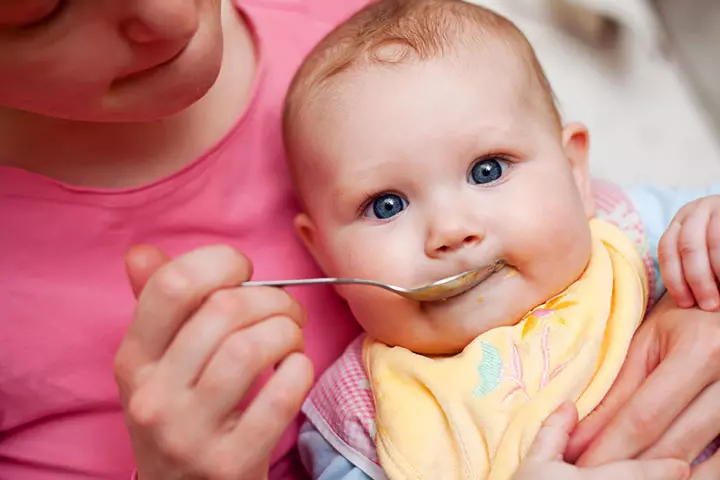
- As vomiting decreases, infants can gradually be introduced to solid foods during weaning.
- Keep the baby hydrated with small sips of fluids, and watch for signs of dehydration.
When To Feed The Baby After Vomiting?
The following tips may help you decide when to feed and not feed your baby after vomiting.
- You may offer breastfeeding or bottle feeding after throwing up. If your baby is ready to eat, you may feed them right away.
- Give a small amount of breast milk or fluids after vomiting and observe if they are vomiting again.
After vomiting, feeding breast milk or liquids may help settle down nausea in babies and ease throat irritation. You may offer water with a spoon or in a bottle to babies older than six months.
- If the baby resists feeding after vomiting, wait for a while before trying again.
If the baby has earache or fever, you may give pain medication such as acetaminophen after consulting the pediatrician. The medication can relieve symptoms before feeding again. If your baby has severe vomiting and refuses to feed, seek help from a pediatrician. Not feeding after vomiting could increase the risk of dehydration.
Treatment For Vomiting In Babies
Pediatricians examine the baby and ask about the signs and symptoms before beginning the treatment. If your baby has normal vomiting without any concerning cause, they may not prescribe medications.
Depending on the cause, the following treatment options are recommended (7).
- Oral rehydration solution can be given to babies who can drink without vomiting again.
- Babies with severe dehydration and those who refuse oral intake of fluids may require intravenous (IV) fluids and electrolytes.
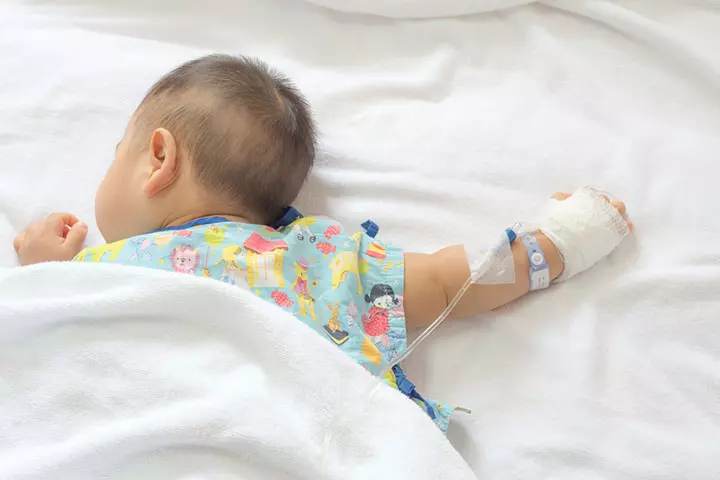
- Antibiotics are prescribed for bacterial infection
- Viral gastroenteritisiThe irritation or inflammation of the stomach and intestines. and other viral infections are usually treated with fluids and other supportive therapies.
- Structural anomalies and conditions may require surgical correction to cure the vomiting.
Note:
Medications (antiemetics) to stop vomiting are not given to children younger than two years due to their potential side effects.
Frequently Asked Questions
1. What should I do if my baby vomits after feeding?
If you are wondering why do babies spit up or vomit after a feeding, you may try these (8):
- Holding the baby upright for at least 30 minutes after a feeding
- Carrying the baby gently and avoiding shaking them immediately after a feeding
- Burping them often
- Feeding smaller portions in frequent intervals (in case of a solid food diet)
2. Can solids cause vomiting?
Yes, some babies may take time adjusting to a solid food diet and thus vomit in response (9).
3. Should I stop feeding my baby if they are vomiting?
If your baby is not dehydrated and has a normal appetite, it is generally safe for them to eat solid foods as usual. However, you may consult your baby’s doctor for personalized advice (1).
Vomiting in babies could be a symptom of several issues, ranging from mild to serious medical conditions. In most cases, a baby’s vomiting is self-resolving and manageable with short-term medications. However, check your baby’s vaccination schedule, get them vaccinated against rotavirus, and maintain good hygiene to lower the risk of vomiting due to pathogens. Also, if your little one is experiencing vomiting, avoid sending them to daycare or for outdoor play to prevent the spread of the infection. If the vomiting is persistent and severe and accompanied by other symptoms such as fever, diarrhea, and the appearance of blood, seek immediate medical care.
Infographic: Possible Complications Of Vomiting In Babies
Persistent vomiting can disturb a baby’s nutritional status; first-time parents need to know the adverse effects of chronic vomiting. Our infographic shares how chronic vomiting affects the baby’s nutritional status and what complications it can cause over time.
Some thing wrong with infographic shortcode. please verify shortcode syntax
Illustration: MomJunction Design Team
Learn the best way to care for a child who is vomiting or having diarrhea. Learn how to stay hydrated, which foods to avoid, and when to seek medical attention.
Personal Experience: Source
MomJunction articles include first-hand experiences to provide you with better insights through real-life narratives. Here are the sources of personal accounts referenced in this article.
i. Our experience with pyloric stenosis;https://bungalowblooming.com/2016/09/13/our-experience-with-pyloric-stenosis/
References
1. Vomiting in children and babies; The National Health Service
2. What is baby reflux? Symptoms and support; NCT UK
3. Food Allergies in Children; Johns Hopkins Medicine
4. Milk allergy and lactose intolerance in babies and children; Pregnancy, Birth and Baby, Australia
5. Vomiting (0-12 Months); Seattle Children’s Hospital
6. Vomiting in children; NHS
7. Vomiting in Infants and Children; Health Direct, Australia
8. Gastrointestinal problems; University of Rochester Medical Center
9. Vomiting in babies; Pregnancy, Birth, And Babies
Community Experiences
Join the conversation and become a part of our nurturing community! Share your stories, experiences, and insights to connect with fellow parents.
Read full bio of Dr. Elna Gibson
Read full bio of Dr Bisny T. Joseph
Read full bio of Rohit Garoo
Read full bio of Shinta Liz Sunny








